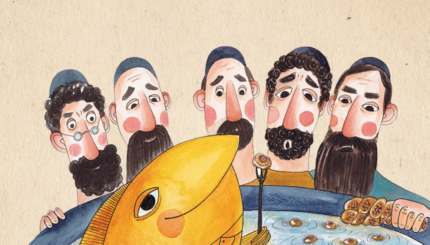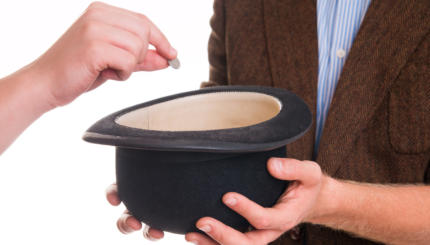Defining humor of any kind is a bad business to be in. The minute you lay down a rule, you can be sure that some schmuck will tap you on the shoulder and say, “Ahem. What about Danny Kaye? Nachman of Breslov? How could you leave out Larry David? Are you joking?” Like a wannabe stand-up comic on his first open-mic night, all we can do is try.
What makes a joke, or story, or television episode qualify as Jewish humor is not — cannot be — just that it was created by a Jew. (If that were the case, some enormous percentage of all comedic American TV shows and movies would qualify.) There must be something inherently Jewish about Jewish humor. And so, while there is no single infallible determinant of the Jewishness of a joke, we can perhaps describe the tendencies, stylistics, even poetics of Jewish humor.
Jewish Humor Laughs in the Face of Power
First and foremost, Jewish humor snickers in the face of authority. This tendency dates back to the first recorded laughter in the scriptural tradition, in Genesis 18:12, when the mother of the Jewish people, Sarah, laughs at the notion, delivered by divine messenger, that she will conceive a child in her dotage. Sarah’s laughter is, in effect, a minor rebellion against God, who proceeds to chew her out: “Is anything too hard for the Lord?” And so, the subversive tradition of Jewish humor began.
A few thousand years later, in the 19th and especially 20th centuries, Jewish humor perpetuated this trend by tittering across all sacred boundaries. Practitioners of such transgressive Jewish humor include Franz Kafka, whose darkly comic stories ridicule the all-powerful bureaucracies of the modern state; Lenny Bruce, whose obscenities and profanities irked 1960s censors and landed him in jail; and, more recently, Jon Stewart, the former Daily Show host who spent a half hour each weeknight cutting up politics and politicians.

Help us keep Jewish knowledge accessible to millions of people around the world.
Your donation to My Jewish Learning fuels endless journeys of Jewish discovery. With your help, My Jewish Learning can continue to provide nonstop opportunities for learning, connection and growth.
Some linguists have gone so far as to suggest that the vernacular inventiveness of the entire Yiddish language can be regarded as a beautiful satire on the formality of German — a comic power that carries over into what Yiddish maven Leo Rosten has called “Yinglish.” As we all know, if you want to take a highfalutin word down a peg, you can simply add the typical Yiddish prefix “shm-” as an alte kocker — roughly translated as “old fart” — might: “Seriousness, shmeriousness!”
Navel-Gazing and Philosophizing
And yet, while it’s often about subversion, Jewish humor also tends to navel-gaze, philosophize, ponder. As Moshe Waldoks and Bill Novak suggest in their Big Book of Jewish Humor, Jews are most often funny about something, and it’s usually something they know quite a bit about. In this mood, Jewish humor takes on many forms, ranging from extreme exaggerations of the logical acrobatics of a Talmudic scholar, to Saul Bellow’s riffs on philosophy, to Seinfeld-ian analyses of social etiquette.
In each of these examples, humor performs a social function, drawing together people who share similar cultures: If you haven’t studied the Talmudic tractate Masekhet Beitzah, struggled through Heidegger or visited New York City, you may not end up laughing. Whenever a joke is about something — whether that something is as general as an ethnic stereotype, or as specific as one rabbi’s bad breath — who laughs and how much they laugh depend on how familiar they are with the target. As the philosopher Ted Cohen suggests, humor divides the world into “us” (we who get the joke) and “them” (those humorless jerks who don’t).
For Jews, throughout history, various lines between “us” and “them” have been crucial, imposed internally as well as externally –think Jewish/Goyish, to use the Yiddish for non-Jews, offensive today but part of the vernacular in Yiddish culture past. There’s also Orthodox/Reform, Israel/Diaspora, Ashkenazic/Sephardic, et cetera. Humor has always been, and continues to be, one way to draw such fundamental lines.
Attentive readers might now be scratching their heads: Jewish humor (1) crosses boundaries and (2) draws lines? Isn’t that a bit, well, hypocritical? It is. And that’s part of the beauty of humor, and Jewish humor in particular: it doesn’t have to make sense, be consistent, or tell the truth.
Comedy doesn’t have to do anything, in fact, except make people laugh — and often enough in Jewish history, a bit of laughter has provided solace when nothing else could. Joking has served as a coping mechanism for all the worst afflictions faced by the Jewish people, from persecution in Czarist Russia to ongoing trauma in the Middle East to the threat of assimilation all over the world. Dark Jewish joking has even, in some controversial examples, responded to the Holocaust.
Some may decry jokes about Hitler, pogroms, or intermarriage as tasteless, but humor by its nature breaks every rule. And this is the power of Jewish humor. Comedy grants an unlimited license to experiment, to invent, to create. And Jewish humor — in all its contradictions, subversions, and possibilities –i s one of the ways that Jews, through the ages, have created an idea of themselves.



